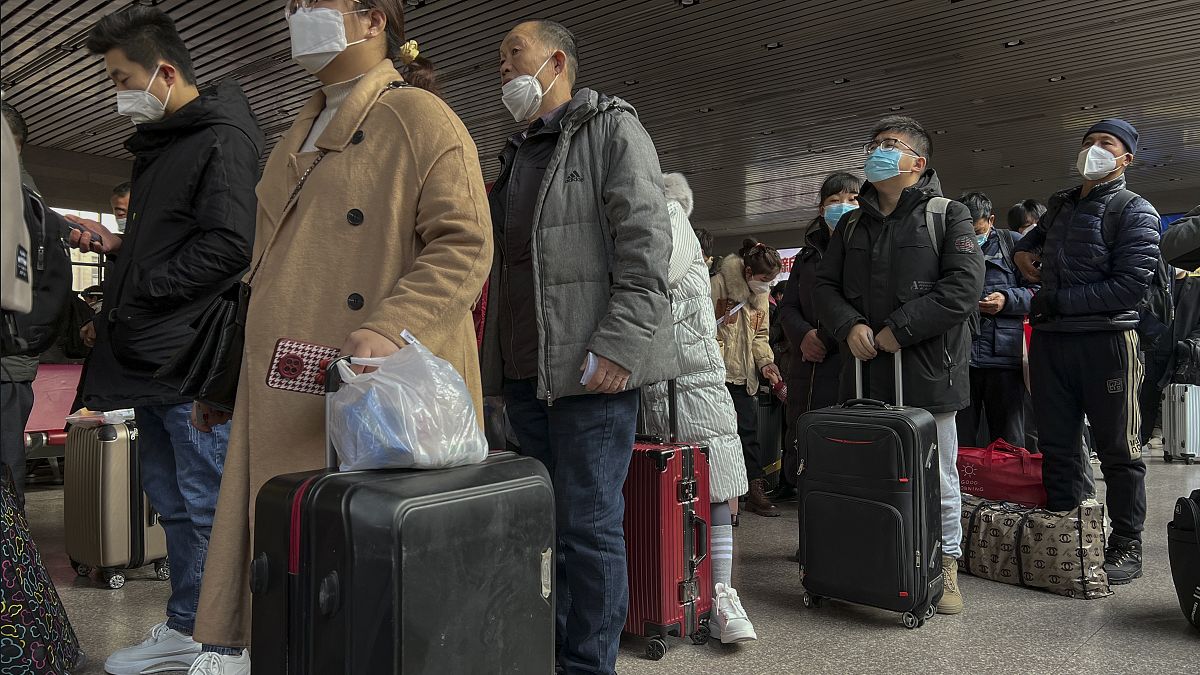Travel restrictions on people coming from China, Sweden takes over the EU presidency and some small inflation respite.
After the end-of-year holidays, political activity in the European Union institutions slowly restarted this week.
In a moment of déjà vu though, the pandemic once again became a central issue because of China, where a massive outbreak of COVID-19 cases followed the end of so-called "zero-COVID" measures.
On Wednesday, EU countries agreed to "strongly encourage" a requirement for all travellers from China, regardless of nationality, to take a test before boarding a flight to Europe.
The decision, which is not legally binding, was made by the EU's integrated political crisis response, a body that helps coordinate crisis management among the 27 member states. Germany's Foreign Affairs Minister, Annalena Baerbock, stressed the need for cooperation.
"We need to take the news about coronavirus coming out of China very seriously, about which China has released very little information in recent times," she said.
"It is not only close European coordination that is so important, but also our work together with the World Health Organisation on full transparency about what the current situation in China actually is."
Sweden takes the reigns
This week also saw Stockholm take over the presidency of the Council of the EU, a rotating tenure that changes between member states every six months.
The Swedish Prime Minister, Ulf Kristersson, made his first official visit of the presidency to Paris, meeting with French President Emmanuel Macron.
Kristersson outlined the possibility of a partnership with France to build new nuclear power plants in Sweden.
Since the war in Ukraine, energy sovereignty has become central in the debate about the bloc's short and long term policies.
Also connected to Russia's invasion is NATO's enlargement since both Sweden and Finland asked to join the military alliance last year. Macron reiterated his desire to see the two join very soon.
While in Paris, the Swedish prime minister also laid out the challenges of the next six months.
"Sweden is taking over the presidency at a time when the EU has suffered multiple crises in parallel. Russia’s invasion of Ukraine is, of course, the worst of these, and a Ukrainian victory is an existential issue for Europe and the entire world," Kristersson said on Tuesday.
"But we are also facing the energy crisis, the climate crisis, soaring inflation and the issue of European competitiveness."
When it comes to Europe's competitiveness, Göran von Sydow, director of the Swedish Institute for European Policy Studies says Stockholm is not keen on increasing state intervention when faced with US President Joe Biden's Inflation Reduction Act.
"The Swedish sort of point of departure in this field is that we should stay to the state aid rules. We should not move into a more state-interventionist economic paradigm," von Sydow told Euronews.
"But of course, this is a bit challenging given the response that many actors are now arguing in favour of, namely, a response that mirrors the American Inflation Reduction Act and the policies included in that.
"So for Sweden, this will be a task of navigating a little bit, of trying to steer perhaps the agenda closer to what would be traditional Swedish concerns," he added.
Inflation trends downwards
Europeans had reason to be cautiously optimistic on Friday as annual inflation across the eurozone fell back into single-digit territory at 9.2% by the end of December, according to Eurostat estimates.
Inflation started easing in November but still stood at 10.1%.
It comes as gas prices, one of the main drivers behind last year's record-breaking inflation, returned to pre-war levels amid unusually warm weather.
Although the news can be seen as a positive development, the eurozone's inflation rate represents almost five times the 2% target set by the European Central Bank (ECB).
The bank has in recent months raised interest rates at an aggressive pace to make spending more expensive and tame surging prices.
"We stand ready to adjust all of our instruments within our mandate to ensure that inflation returns to our medium-term inflation target," ECB President Christine Lagarde said last month.
Still, the majority of member states that use the euro as currency saw inflation decrease over the past month, with a marked drop in Germany, from 11.3% in November to 9.6% in December.
Spain (5.6%), Luxembourg (6.2%), France (6.7%) and Ireland (8.2%) recorded some of the lowest inflation rates across the bloc, while Latvia (20.7%), Lithuania (20%) and Estonia (17.5%) again saw the highest levels.
